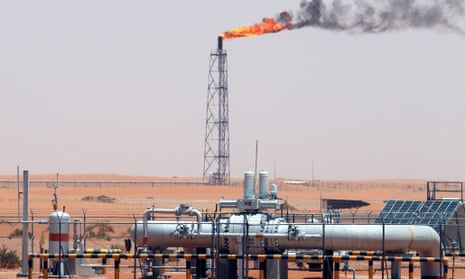The UK government has provided well over a billion pounds in loans to fossil fuel projects around the world despite a pledge to withdraw financial support from such schemes, an analysis of loans made by the UK’s export credit agency has revealed.
Gazprom in Russia, Brazil’s state-owned oil company and petrochemical companies in Saudi Arabia are among the companies benefiting from around £1.7bn in government funding over the course of the parliament, Greenpeace found.
The UK Export Finance (UKEF) deals appear to fly in the face of the 2010 coalition agreement, where the Conservatives and Lib Dems pledged to clamp down on funding for fossil fuel operations abroad.
“We will ensure that UK Trade and Investment and the Export Credits Guarantee Department [UKEF is its operating name] become champions for British companies that develop and export innovative green technologies around the world, instead of supporting investment in dirty fossil-fuel energy production,” the agreement said.
Just days after taking office, prime minister David Cameron promised he would lead the “greenest government ever”. UKEF is a ministerial department that reports to Vince Cable, the business secretary.
The biggest deal in the trawl of UKEF annual reports is a £447m loan to engineering company Fluor Ltd for Sadara in Saudi Arabia, a $19bn petrochemical plant owned by the country’s oil company and US-based Dow Chemical Company that claims to be the world’s largest of its kind. UKEF says the loan was “the largest it has ever supported on a limited recourse project financing basis”.
A £330m loan was provided to Rolls Royce to provide state-owned Gazprom, the world’s biggest natural gas extraction company, with a compressor station to help transport natural gas.
Other big projects include a series of loans totalling £528m to companies working with Brazil’s Petrobas, to aid oil and gas exploration. Petrobras has been at the centre of a huge corruption scandal in Brazil, with dozens of employees charged in December.
The financing is designed to help British companies involved in the projects.
Will McCallum, policy adviser at Greenpeace UK, said: “The loophole allowing UK Export Finance to continue funding highly polluting infrastructure, and the extraction of fuels we urgently need to leave in the ground, is one that must be closed if the government is to honour its international commitment to a 2C limit [in temperature rises].
“[Energy and climate secretary] Ed Davey’s efforts to eliminate overseas funding for coal power generation are very welcome, but the UK could do a lot more to push for a binding commitment from the OECD to phase out funding for all high carbon projects. Nothing would send that message more strongly than limiting the UK’s export finance for these schemes.”
The rate of funding for fossil fuel projects around the world appears to have speeded up in the last financial year, with around £1bn given to such operations in the 2013-14 financial year. At home, the government has come under fire for overseeing a boom in fossil fuel investment and a decline in clean energy investment.
Coal-mining, petrochemical complexes, and oil and gas exploration and infrastructure are among the industries benefiting from the loans and guarantees, which cover projects in countries including Slovakia, Russia, Brazil, India, Germany, Norway, Vietnam, the Phillipines and Saudi Arabia.
MP Joan Walley, the chair of the Environmental Audit Committee, which has investigated the government’s fossil fuel subsidies before, said: “At the UN Rio+20 Earth Summit [in 2012] the UK government agreed to phase out harmful and inefficient fossil fuel subsidies, so I am disappointed to discover the government is still providing billions in loans to fossil energy projects around the world that are fuelling climate change. Taxpayer cash should not be used to subsidise the fossil fuel industry in the twenty first century.”
A spokeswoman for UKEF said it reviewed environmental and social issues before approving financing. She said: “UKEF would take dirty fossil-fuel energy production to refer to projects producing pollution in excess of international environmental standards. UKEF adheres to the standards set out in the OECD Common Approaches and will normally refuse support for exports to projects that do not meet those standards.
“UKEF has an extensive programme of raising market awareness of its products and services to companies in the renewables sector. However demand has been low; many companies are concentrating on the domestic market, many need equity and development finance, rather than the services of UKEF, and companies which are exporting are focussing on mature markets where the need for risk protection and export finance is limited.”

Comments (…)
Sign in or create your Guardian account to join the discussion